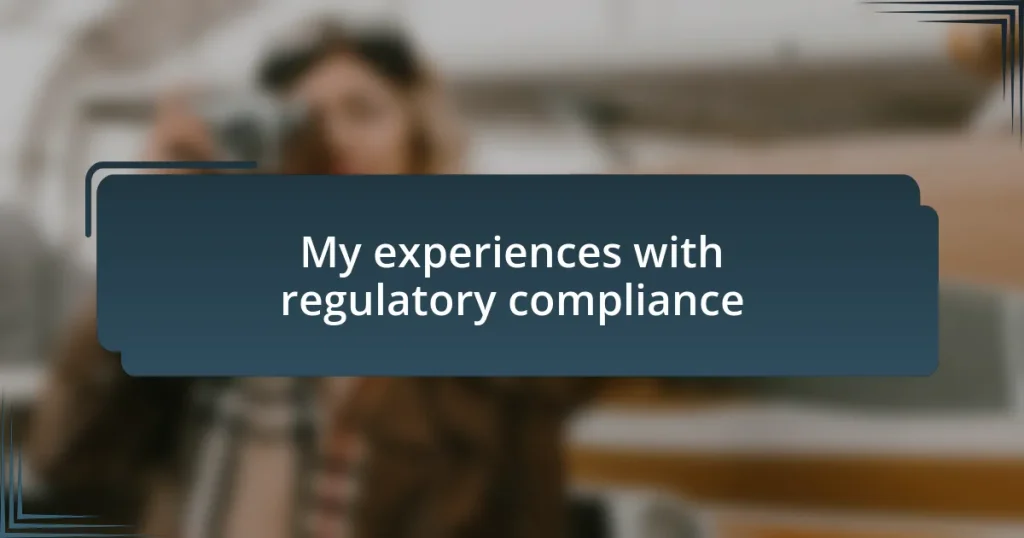Key takeaways:
- Regulatory compliance is essential for building trust and credibility with clients and stakeholders, as minor oversights can lead to significant repercussions.
- Continuous education and a proactive approach are crucial for navigating evolving regulations and fostering a culture of compliance within organizations.
- Leveraging technology and maintaining open communication can streamline compliance processes and enhance organizational efficiency.
- Future trends indicate a shift towards AI and machine learning for compliance management, along with an increased focus on transparency and ethical practices.
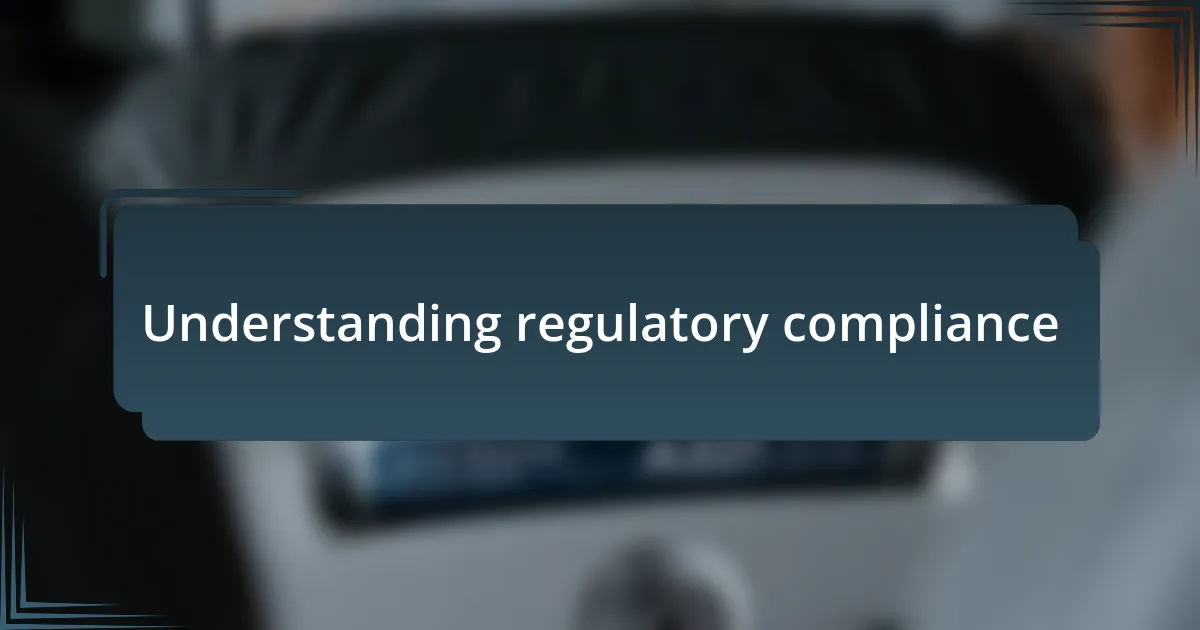
Understanding regulatory compliance
Understanding regulatory compliance can feel like navigating a labyrinth. I remember working on a project where I was responsible for ensuring our practices aligned with industry regulations. The constant changes in laws made me wonder: how can businesses keep up? This led me to realize that compliance isn’t just about ticking boxes; it’s about building trust with clients and stakeholders.
For me, the most enlightening moment came during an audit when a simple oversight revealed how easily a small non-compliance issue could escalate into a significant problem. The stress of the situation was palpable, showing just how critical it is to stay informed and proactive. Have you ever faced a situation where a minor detail turned out to have larger consequences? That experience taught me the importance of a culture of compliance within an organization.
When I reflect on regulatory compliance, I see it as a foundation for ethical business practices. Each regulation serves a purpose, often protecting consumers or the environment. Engaging with these regulations has been more than a professional duty; it’s been a personal commitment to making a positive impact in my field. Compliance may seem cumbersome at times, but it ultimately fosters a healthier business landscape.
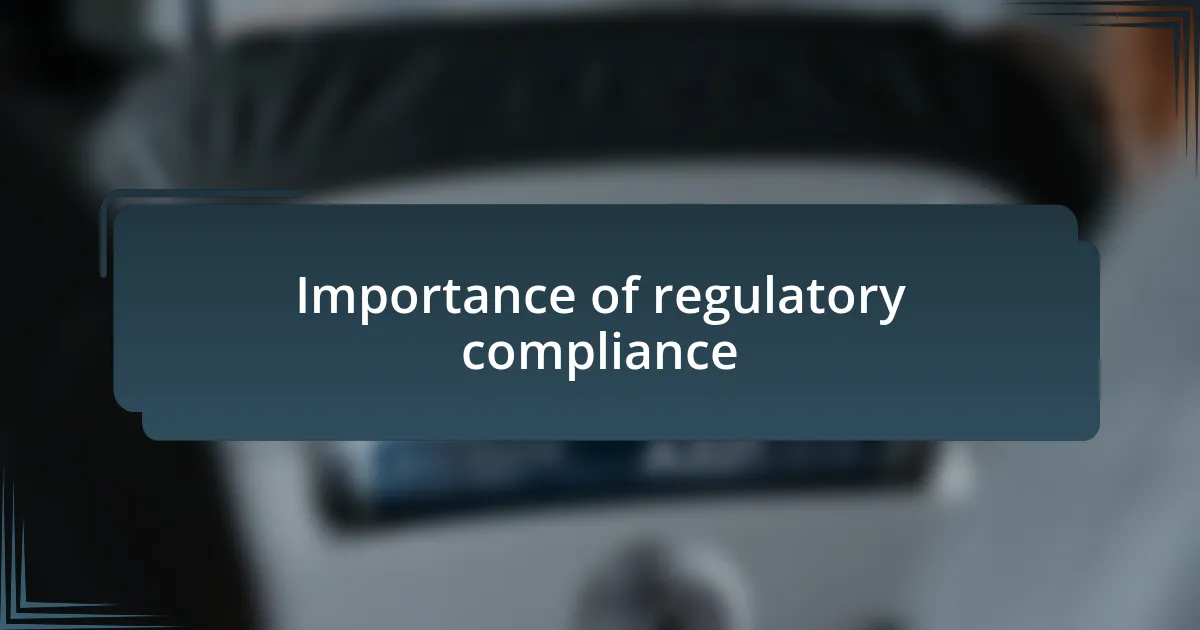
Importance of regulatory compliance
Regulatory compliance is critical for maintaining a company’s reputation. I recall a time at my previous organization when a client raised concerns about our compliance practices. It opened my eyes to how quickly perception can shift—one small misstep could tarnish years of hard work. This experience reinforced my belief that compliance is not just about regulations; it’s about enhancing trust and credibility among clients.
Moreover, not adhering to regulatory standards can lead to substantial financial repercussions. I once attended an industry conference where a speaker shared a story about a business that faced significant penalties due to non-compliance. The ramifications weren’t just monetary; they lost clients and had to re-establish their reputation from scratch. This situation made me understand the long-term impact of compliance and how it can protect a company from unforeseen setbacks.
Additionally, I’ve found that regulatory compliance promotes innovation and operational efficiency. In my experience, companies that prioritize compliance often streamline their processes to meet regulations effectively. This proactive approach not only mitigates risks but also enhances overall operational performance. Have you ever noticed how compliant organizations tend to foster a culture of continuous improvement? It’s invigorating to witness how compliance can catalyze positive change within teams.
| Aspect | Importance |
|---|---|
| Trust and Reputation | Maintains client relationships and credibility |
| Financial Integrity | Prevents fines and potential loss of revenue |
| Operational Efficiency | Encourages better processes and innovation |
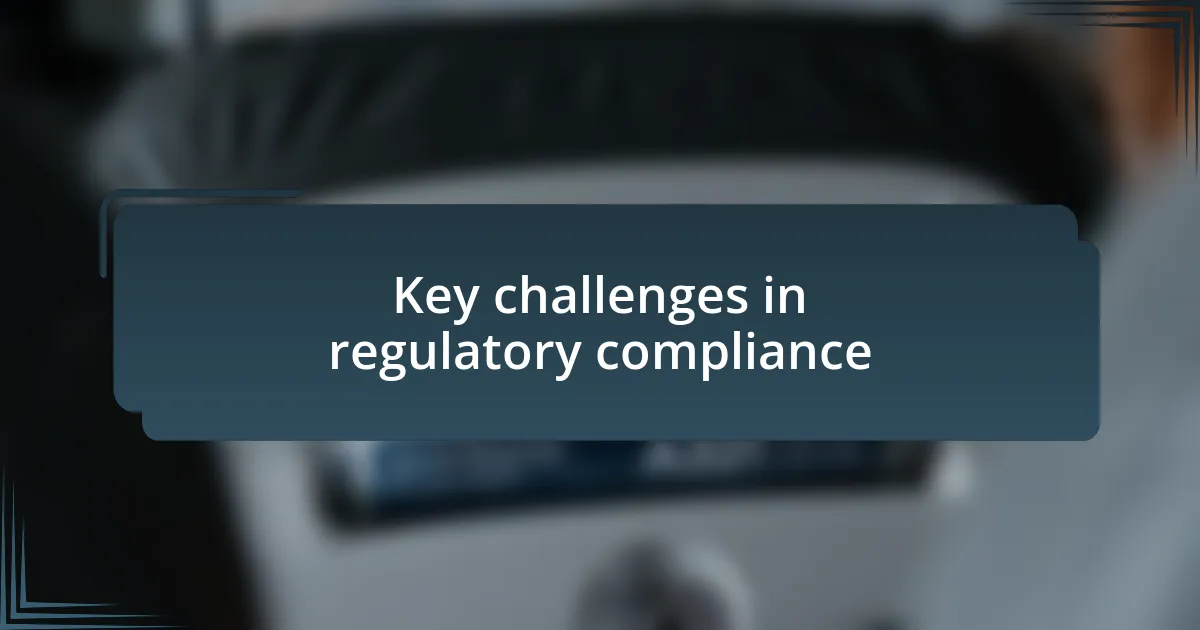
Key challenges in regulatory compliance
The road to regulatory compliance is often filled with unexpected hurdles. I vividly remember a project where a sudden change in regulations caught our team off guard. We had built our strategy around existing rules, and suddenly, we were facing a steep learning curve. This experience taught me just how dynamic the regulatory landscape can be, requiring constant vigilance and adaptation.
As I navigated through the complexities of compliance, I began to notice several persistent challenges that can derail even the most careful plans:
- Evolving Regulations: Staying updated on changing laws and guidelines can overwhelm teams, necessitating continuous education.
- Resource Allocation: Compliance efforts often compete with other priorities, making it difficult to secure necessary resources and personnel.
- Documentation and Reporting: The meticulous nature of record-keeping can drain time and energy, and I’ve seen teams struggle with the volume of required documentation.
- Cultural Resistance: Changing mindsets around compliance can be a slow process, often facing pushback from employees who view it as a burden rather than an essential part of the business.
These challenges remind me that a proactive approach is vital. In my experience, fostering an open dialogue about compliance can significantly ease transitions and help cultivate a culture that prioritizes understanding over apprehension.
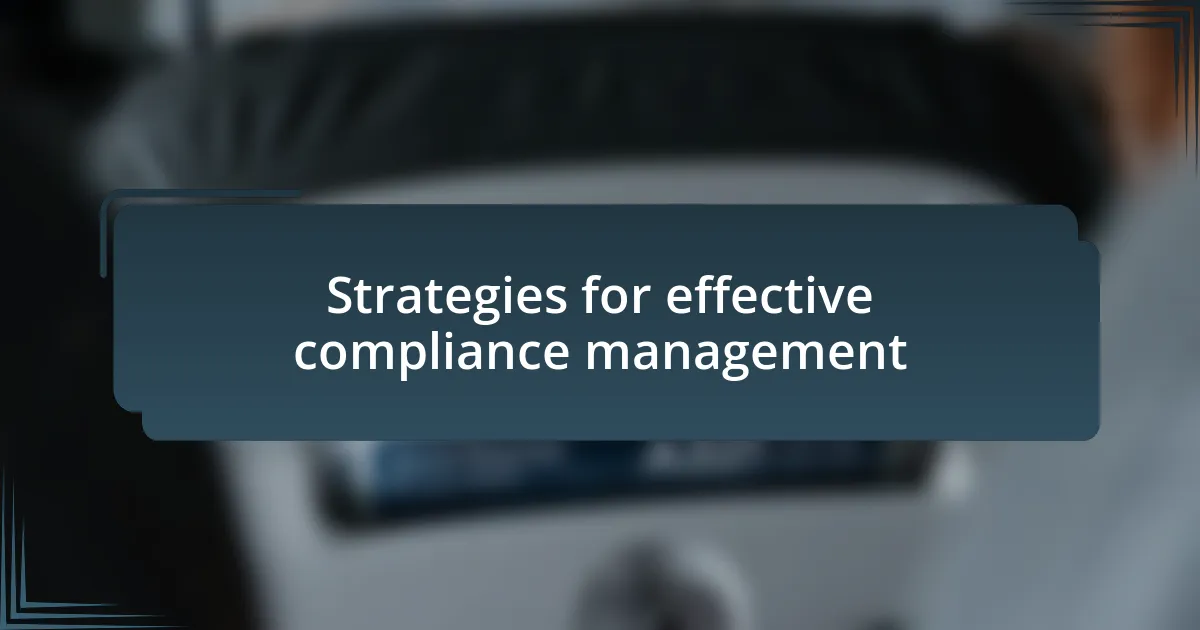
Strategies for effective compliance management
Implementing a robust compliance management system begins with creating comprehensive training programs tailored to the specific needs of your team. I recall a time when we rolled out a compliance workshop that not only covered regulations but also involved real-life scenarios our employees faced. The shift in understanding was palpable; employees felt empowered rather than overwhelmed.
Another critical strategy is leveraging technology to streamline compliance processes. In my previous role, we adopted a compliance management software that automated documentation and tracking, which drastically reduced our administrative burden. It was fascinating to witness how technology transformed a tedious task into a more manageable and efficient process, allowing my team to focus on strategic compliance initiatives.
Finally, fostering a culture of transparency is paramount. I’ve found that when team members openly share their compliance challenges, it fosters a sense of collective responsibility. Do you remember the last time your team brainstormed solutions to a compliance issue together? It not only builds trust but also cultivates innovative problem-solving among colleagues, making compliance a shared journey rather than a solitary struggle.
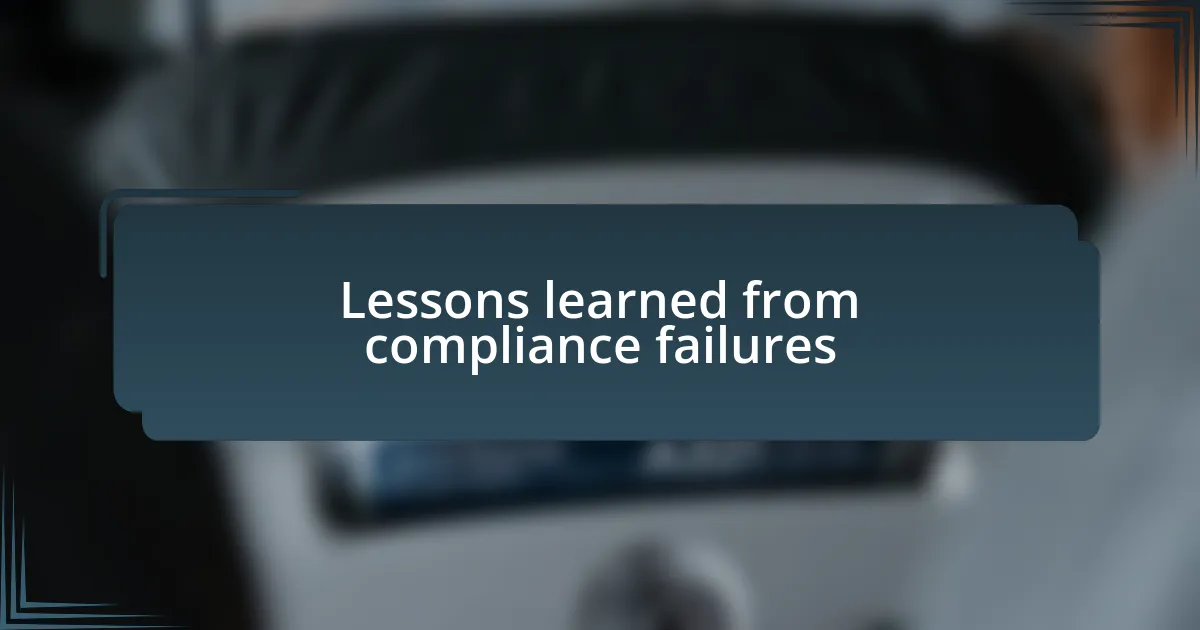
Lessons learned from compliance failures
When reflecting on compliance failures, I’ve seen firsthand how underestimating the importance of due diligence can lead to significant setbacks. In one instance, a routine audit revealed a glaring oversight in our reporting processes, which not only put us at risk of penalties but also shook the trust our stakeholders placed in us. It’s a stark reminder that thoroughness shouldn’t be an afterthought—how often do we rush through tasks only to face the repercussions later?
Another lesson that stands out is the need for strong internal communication. I remember a situation where a newly implemented regulation was poorly communicated to the team, leading to widespread misinterpretation and non-compliance. The stress it caused was palpable and completely avoidable. This experience taught me that clarity and open lines of communication are crucial—how can we expect everyone to comply if we don’t ensure they understand the rules?
Lastly, I’ve learned that compliance is not static; it’s a dynamic and evolving journey. In a previous role, we faced a significant challenge when a sudden regulatory change caught us off guard due to our reliance on outdated processes. This taught me the importance of agility in compliance practices. Are we regularly reviewing and updating our compliance systems to adapt to new challenges? Continuous learning and adaptation have become fundamental principles in my approach since that experience.
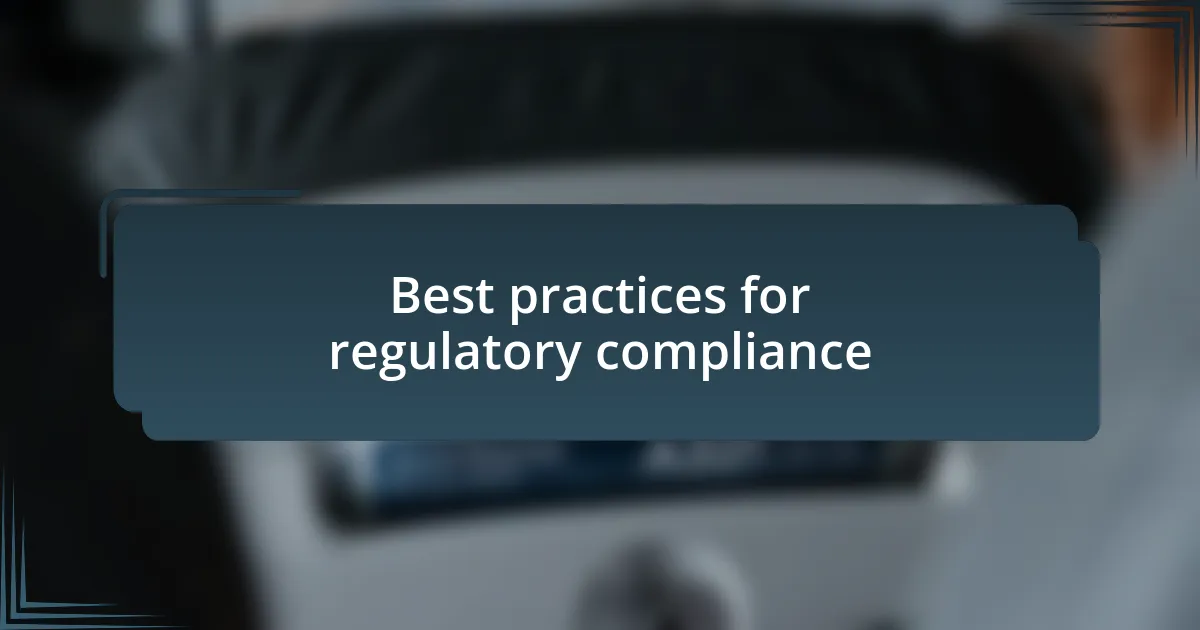
Best practices for regulatory compliance
Establishing a culture of compliance is essential for any organization striving for regulatory adherence. I vividly recall a time when our compliance officer initiated regular training sessions, transforming what felt like a mundane obligation into engaging discussions. These sessions fostered a sense of ownership among team members—have you noticed how empowered employees can drive compliance more effectively?
Another best practice I advocate is leveraging technology to streamline compliance processes. I once managed a project where we utilized compliance management software to track regulations and deadlines. It not only reduced our manual workload but also significantly minimized the risk of errors. Can you imagine how much smoother your compliance activities could be with the right tools at your disposal?
Regular audits and self-assessments play a fundamental role in maintaining compliance integrity. I remember the relief that washed over our team after conducting a thorough internal audit, which uncovered potential weaknesses before they became problematic. How often do we overlook the necessity of a second set of eyes? Prioritizing these assessments has not only helped us identify gaps but also strengthened our overall compliance framework.
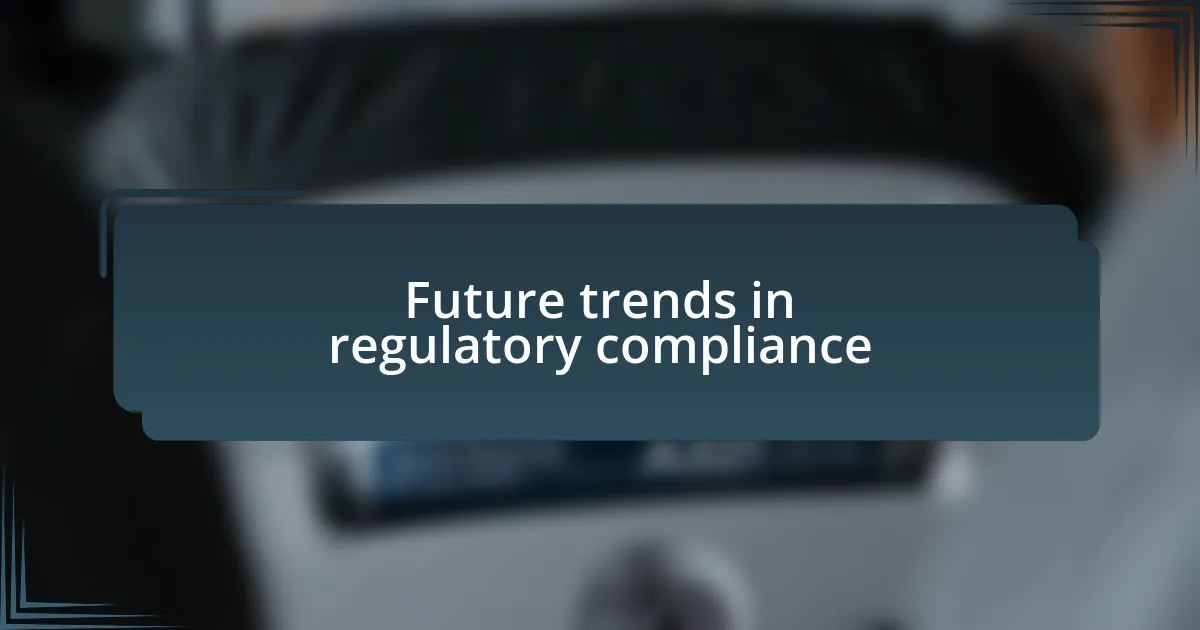
Future trends in regulatory compliance
As I look to the horizon of regulatory compliance, one trend that stands out to me is the increasing use of artificial intelligence (AI) and machine learning. I remember attending a conference where an expert shared how AI can analyze vast amounts of data to identify compliance risks in real-time. It struck me that this could drastically reduce the burdens of manual oversight—are we ready to let technology take on the heavy lifting?
Moreover, the rise of remote work has undoubtedly shifted how compliance is managed. I’ve personally experienced the challenges of maintaining compliance remotely, especially when training employees who are spread across different locations. It became clear to me that organizations must now prioritize virtual compliance training programs—how effective do you think these can be when employees engage from the comfort of their homes?
Lastly, I sense a growing emphasis on transparency and ethical compliance. Reflecting on a recent project, I was inspired by how our organization openly shared compliance efforts with stakeholders. It made me realize that future regulations might not only focus on adherence but also on fostering trust—what does it mean for your organization to be seen as a compliant and trustworthy partner?











